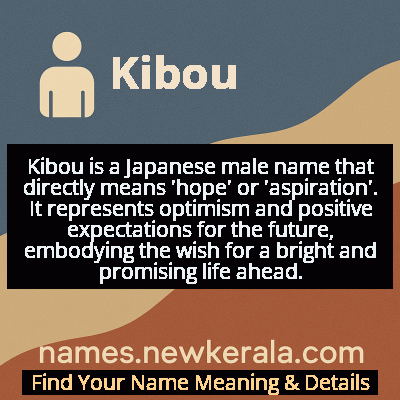Kibou Name Meaning & Details
Origin, Popularity, Numerology Analysis & Name Meaning of Kibou
Discover the origin, meaning, and cultural significance of the name KIBOU. Delve into its historical roots and explore the lasting impact it has had on communities and traditions.
Name
Kibou
Gender
Male
Origin
Japanese
Lucky Number
4
Meaning of the Name - Kibou
Kibou is a Japanese male name that directly means 'hope' or 'aspiration'. It represents optimism and positive expectations for the future, embodying the wish for a bright and promising life ahead.
Kibou - Complete Numerology Analysis
Your Numerology Number
Based on Pythagorean Numerology System
Ruling Planet
Uranus (Rahu)
Positive Nature
Strong sense of order, loyal, practical, and disciplined.
Negative Traits
Stubborn, overly serious, rigid, and prone to feeling restricted.
Lucky Colours
Blue, gray.
Lucky Days
Saturday.
Lucky Stones
Blue sapphire.
Harmony Numbers
1, 7, 8.
Best Suited Professions
Managers, engineers, accountants, organizers.
What People Like About You
Dependability, discipline, practicality.
Famous People Named Kibou
Kibou Takeda
Fictional Character
Protagonist in various Japanese novels and manga series, representing resilience and optimism
Kibou Yamamoto
Educator
Founded several educational institutions in post-war Japan, emphasizing hope and renewal
Kibou Sato
Community Leader
Organized disaster relief efforts and community rebuilding projects after natural disasters
Name Variations & International Equivalents
Click on blue names to explore their detailed meanings. Gray names with will be available soon.
Cultural & Historical Significance
The name reflects the Japanese aesthetic of 'mono no aware' - the awareness of impermanence and the beauty in transient things, while maintaining hope for renewal and growth. It also connects to the cultural practice of 'kizuna' (bonds) and the collective hope for community well-being, making it more than just an individual aspiration but a shared cultural value that emphasizes interconnectedness and mutual support in pursuing better futures together.
Extended Personality Analysis
Individuals named Kibou are typically perceived as optimistic, resilient, and forward-thinking personalities. They often exhibit a natural ability to maintain positive outlooks even in challenging circumstances, serving as sources of inspiration and encouragement for those around them. Their hopeful nature is complemented by practical determination, as they don't merely wish for better outcomes but actively work toward them with patience and persistence.
Kibou's personality often includes strong empathetic qualities and the ability to see potential where others might see limitations. They tend to be natural motivators and peacemakers in group settings, using their optimistic perspective to help resolve conflicts and build consensus. While generally positive, they may sometimes struggle with unrealistic expectations or disappointment when reality doesn't match their hopeful visions. However, their inherent resilience typically allows them to bounce back quickly and find new reasons for optimism, making them valuable friends and colleagues who can lift others' spirits during difficult times.
Modern Usage & Popularity
In contemporary Japan, Kibou remains a meaningful though relatively uncommon given name, chosen by parents who wish to imbue their child's identity with positive aspirations and optimistic values. The name has seen fluctuating popularity, with noticeable increases during periods of national challenge or renewal, such as after natural disasters or during economic recoveries. While not among the most popular names in recent decades, it maintains a steady presence and is sometimes chosen by parents seeking meaningful names that reflect their hopes for their child's future. The name has also gained some international recognition through Japanese media and cultural exports, occasionally being adopted by parents outside Japan who appreciate its positive meaning and cultural significance.
Symbolic & Spiritual Meanings
Symbolically, Kibou represents the human capacity for optimism and the belief in positive outcomes despite present circumstances. It embodies the metaphorical 'light in darkness' that guides people through challenging times and serves as a reminder that every ending contains the seeds of new beginnings. The name carries connotations of dawn after night, spring after winter, and recovery after hardship - universal symbols of cyclical renewal and the persistence of life. In Japanese symbolism, it connects to images like the rising sun, cherry blossoms representing new beginnings, and the phoenix rising from ashes, representing not just passive wishing but active anticipation and preparation for better futures.

